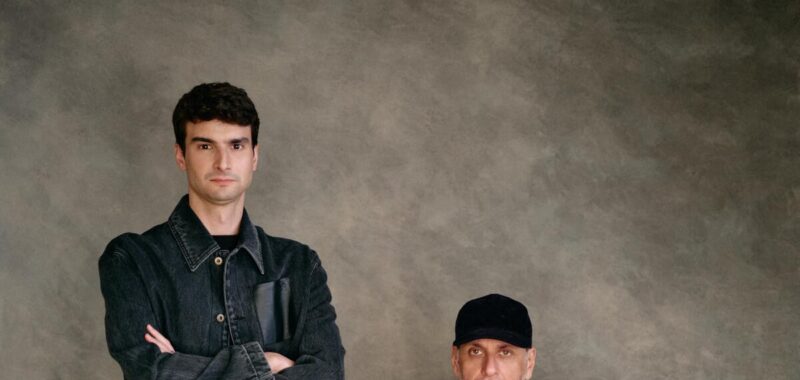
“Justin is a wunderkind,” says prolific Italian director Luca Guadagnino about on-the-rise screenwriter Justin Kuritzkes during a joint interview at a Los Angeles hotel.
Kuritzkes penned both of Guadagnino’s films released this year: “Challengers,” the sleek drama chronicling a love triangle amid the competitive world of professional tennis, and “Queer,” an adaptation of legendary author William S. Burroughs’ postwar, Mexico City-set novella about a gay American expat and his drug-infused relationship with a younger lover.
For Kuritzkes, an accomplished playwright, “Challengers” represented his first foray into screenwriting. He’d played tennis as a child but quit after realizing there was a ceiling to how good he could become. His passion for the sport was rekindled only many years later when watching a controversial 2018 match between Serena Williams and Naomi Osaka.
Conversely, Guadagnino had little interest in the subject until he read Kuritzkes’ take.
“Tennis is full of rules, and I refused to understand them,” Guadagnino says. “But in reading the script for the first time, which was very specific about the actual rules of the game, I realized how brilliant the writing was, because I could understand and follow everything.”
But Kuritzkes’ role in “Challengers” didn’t end after the director signed on. As part of his cinematic practice, Guadagnino has his screenwriters by his side throughout production. “It’s very rare for a writer to be included in that way,” says Kuritzkes. “It’s a testament to the generosity and the confidence of somebody like Luca to have his writer there the whole time. And what it ended up being for me was like going to film school every day.”
Working with Kuritzkes throughout the entire filmmaking process — even during editing — is the only way to bring to life the best version of the script, Guadagnino believes.
“As one of the elements that constitute a movie, screenwriting is alive until the end. And the end for me is when an audience watches the movie. The process doesn’t end with the delivery of a script that a studio, a producer or a director deems right,” the director explains. “Because making a movie deals with many unanswered questions on the page that might need another question to be posed to the pages in order to achieve the most precise, inspiring, intuitive translation of what has been put in that screenplay.”
It was during the shooting of “Challengers” that Guadagnino handed Kuritzkes a copy of Burroughs’ slim book. Back then, Kuritzkes was familiar only with Burroughs’ more surreal works “Naked Lunch” and “The Yage Letters.”
“Luca said, ‘Read this tonight and tell me if you’ll adapt it for me,’” recalls Kuritzkes. “Having known Burroughs’ other work, I was really shocked to find that ‘Queer’ was this very linear, straightforward love story between these two very complicated people.”
Guadagnino first discovered Burroughs’ “Queer” at a bookstore in Palermo, Sicily, when he was 17. “I was this very lanky and solitary, feverish, strange boy spending a lot of time in this bookshop,” he recalls. “I saw this book titled ‘Diverso,’ which means ‘different.’ I felt different all my life. I paid for it, went home and I read it, and I was like, ‘Whoa, that’s me.’”
“Queer” was Kuritzkes first time adapting preexisting material. But the tremendous sense of responsibility he felt came not from the text itself but from knowing the significance “Queer” had for Guadagnino, who had been trying to turn it into a movie for a long time.
“I knew that my task was to write Luca this movie he had been dreaming about, and that’s very heavy,” Kuritzkes notes. “After I said yes, of course there were a lot of moments of doubt and a lot of moments of fear.”
“And then you hand me the script like a month later, and it was miraculous,” Guadagnino tells Kuritzkes. “The book is also a comedy, and there is a picaresque quality to it that Justin made a brilliant adaptation of, because it’s a romantic movie, but it’s also very funny.”
Kuritzkes’ way in was realizing he could relate to the less flattering qualities of the narrative’s protagonist, William Lee (played onscreen by Daniel Craig). “He felt like a person I could reach out and touch, whereas the persona of Burroughs felt a little more distant to me,” he says.
Since he watched Guadagnino direct “Challengers” while writing “Queer,” Kuritzkes was tailoring the screenplay to the director’s artistic sensibilities. “I thought, ‘If I hand this crazy scene over to Luca, he’s going to figure out a way to do it. He’s going to figure out a way to make it iconic and essential.’ And so that opens you up to write things you wouldn’t otherwise,” Kuritzkes says.
One such instance happened with a psychedelic drug scene that was minimally described on the page, but Guadagnino turned it into an experiential sequence. “I could never have predicted from one line in a script that that’s what would come,” says Kuritzkes.
To his regret, the 2023 writers’ strike prevented Kuritzkes from being on set during the production of “Queer.” This partnership, however, still has a promising future. Says Guadagnino: “The ambitions within Justin are so large and expansive that is a pleasure for me to nurture them with more material.”

